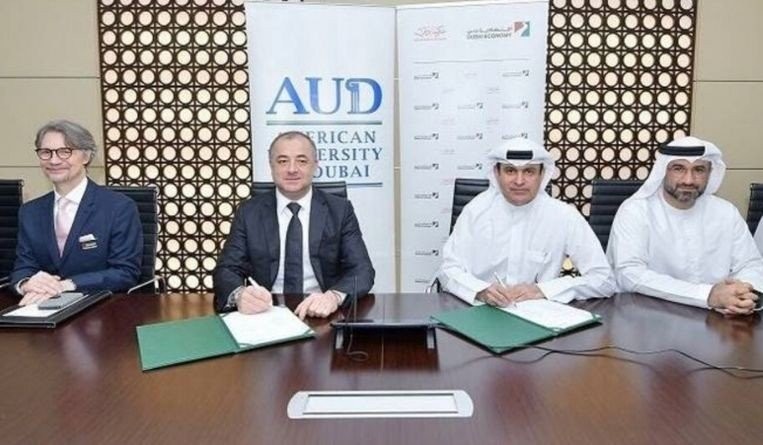American University in Dubai to offer Master’s programme in IP and Innovation Management
30 April 2020

Sami Al Qamzi, director general of Dubai Economy (second from the right), and Elias Bou Saab, executive vice president of the American University in Dubai (AUD) (second from the left), signed a memorandum of understanding between Dubai Economy and AUD to launch a Master’s degree programme in intellectual property and innovation management at the university.
The American University in Dubai (AUD) has entered into a partnership with the government’s Department of Economic Development – also known as Dubai Economy – to launch a Master’s degree programme in intellectual property and innovation management (IM) to be offered by AUD.
Sami Al Qamzi, director general of Dubai Economy, and Elias Bou Saab, executive vice president of AUD, signed the memorandum of understanding for the initiative last month.
The Master’s in IP and IM programme is expected to promote research and development, generate greater innovation and make enterprises more competitive. It is also aligned with United Arab Emirates’ announced plans to create a knowledge-based economy.
The curriculum will include a thesis for which the students will be asked to explore current IP developments and issues in the UAE.
However, for Bassel El Turk, principal and country manager of Rouse in Dubai, this would not need to be a regular thesis. Instead, it could be a project.
“The paper may then vary from anything between legal IP research to an actual business plan with an intangible assets strategy sitting at the core of the business competitive advantage,” says El Turk. “Given the size and resources available at the AUD, this makes the AUD a perfect place to find a proper supervisor from across its departments.”
AUD is ranked among the top 150 universities in the world. It is also recognized globally for its faculty and student diversity and by the Arab world for its capability to produce work-ready graduates
Meanwhile, El Turk says the first set of modules under the taught course should include mandatory IP introductory courses for lawyers, entrepreneurs, innovators and technology professionals.

“They will most likely have little knowledge of what IP really is. The theoretical part is very important to give the knowledge on all areas of conventional IP and clearly set out copyright, trademark, patent, design, trade secrets and geographical indications. Such studies will need to give the legal sense and reasoning of the rights but will need as well to focus more on the commercial sense and benefits,” El Turk says.
According to Hady Khawand, partner and country manager at Saba IP in Dubai, these mandatory courses should include a detailed overview of international conventions and treaties such as TRIPS and Berne Convention.
Meanwhile, the next set of modules should be devoted to practical courses, says El Turk. These modules may eventually become more interactive with each student’s needs and preferences.
“If a student feels that there is a need to get into more detail in terms of the legal nature of these rights, the student may choose more detailed legal courses on IP topics of interest,” he explains. “Other students may find interest in the business/technology or consulting side of IP. This may go even further to the broader concept of intangible assets that have a major impact on the wealth and assets of businesses these days. This part of the course will determine what the student wants to achieve from the degree.”
For Khawand, advanced core courses on the following are important: all international conventions and treaties, UAE’s IP related rights and laws including contract law, competition law and anti-fraud commercial law, litigation and enforcement of IP rights (covering among other things, administrative, civil and criminal procedures, etc.), and anti-counterfeiting, illicit trade and parallel importation of goods.
Khawand says it will also be highly beneficial for the student if the programme can offer them the following elective courses: plant variety protection and biotechnology, IP portfolio management for SMEs and large companies (covering among other things, the best ownership structure of IP Assets), IP valuation, technology transfer and commercialization, introduction to IP law in the EU and a comparative study of IP laws.

“The majority of the people working in the IP industry in the UAE, in the private as well as the public sector, have built their expertise based on experience and personal development,” says Khawand. “A Master’s degree in IP will give an academic common basis of knowledge that from one end will sophisticate further the expertise of professionals in the field and, from the other end, will equip the new generation with the necessary skills to take their career in IP to the next level.”
“More importantly, I deeply believe that the highest the IP knowledge and awareness we can build, the better an innovation nation we will become,” Khawand adds.
Considering there are a lot of IP stakeholders in the market in UAE and Dubai, El Turk says that the curriculum should also make room for several field trips, interviews with industry professionals and innovators and work experiences in corresponding organizations. These include the IP law firms, IP protection and prosecution government agencies, the Gulf Brand Protection Group, IP AIPPI UAE chapter, the Dubai International Financial Centre IP commissioner, innovation hubs, incubators and accelerators.
“Ideally, the needs of IP awareness at the academic level will need to be introduced at an earlier stage in the educational system,” says El Turk. “However, given the multicultural environment of the UAE, the young and dynamic population who strive to innovate in all business sectors, introducing IP programs at a Master’s level addressed to such young innovative working force is a key to drive further innovation on more stable grounds to enhance achievements.”
Explaining it is important for businesses to better understand the value of IP, El Turk and Khawand say their respective firms look forward to this new Master’s programme to become the first step to spreading greater awareness of IP.
Espie Angelica A. de Leon






